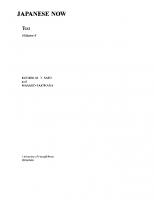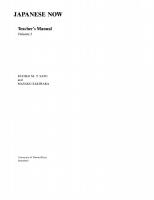Japanese Now: Text — Volume 2 9780824841102
Japanese Now is a popular four-year learning program used in numerous American secondary schools and universities. The f
134 13 15MB
English Pages [232] Year 2023
CONTENTS
ACKNOWLEDGMENTS
INTRODUCTION
TERMS USED IN GRAMMAR NOTES
INTRODUCTORY LESSONS
INTRODUCTORY LESSON 1 JAPANESE VERBS
INTRODUCTORY LESSON 2 FORMAL AND INFORMAL FORMS
LESSONS 1-12
LESSON 1
L E S S O N 2
L E S S O N 3
L E S S O N 4
LESSON 5
LESSON 6
LESSON 7
LESSON 8
L E S S O N 9
LESSON 10
L E S S O N 11
LESSON 12
APPENDIXES
SUMMARY OF GRAMMAR
LIST OF KANJI
LIST OF VERBS
COUNTERS
GLOSSARY
ABOUT THE AUTHORS
Recommend Papers

- Author / Uploaded
- Esther M. T. Sato
- Loren I. Shishido
- Masako Sakihara
File loading please wait...
Citation preview
J A P A N E S E NOW
JAPANESE NOW Text Volume 2
ESTHER M. T. SATO MASAKO SAKIHARA LOREN I. SHISHIDO
University of Hawaii Press Honolulu
C O P Y R I G H T © 1 9 8 3 B Y T H E D E P A R T M E N T OF E D U C A T I O N , S T A T E OF H A W A I I ALL R I G H T S R E S E R V E D M A N U F A C T U R E D IN T H E U N I T E D S T A T E S OF A M E R I C A
T A P E S TO A C C O M P A N Y THIS T E X T A R E A V A I L A B L E FROM: N A T I O N A L C E N T E R FOR A U D I O T A P E S , S T A D I U M B U I L D I N G , U N I V E R S I T Y OF COLORADO, BOULDER, COLORADO 8 0 3 0 9 .
Library of Congress Cataloging in Publication Data (Revised for vol. 2) Sato, Esther M. T., 1915Japanese now. Maps on Lining paper. 1. Japanese language—Text-books for foreign speakers —English. PL539.3.S28 1982 495.6'82421 81-23142 ISBN 0-8248-0773-1 (vol. 1) ISBN 0-8248-0795-2 (vol. 2)
CONTENTS Acknowledgments
vii
Introduction
ix
Terms Used in Grammar Notes
xi
Introductory Lessons
1
Lesson 1
3
Lesson 2
10
Lessons Lesson
13 1
m 5: U —
U 5 U
Lesson 2
26
Lesson 3 Lesson 4
15
/^/Ufv^ f^v^cD
^btzh
Lesson 5
38 49 61
Lesson 6
-7-^5/ f f
74
Lesson 7
, 5 ) are used to make the tentative form
=t i f :
:
Conjugation o f \-fitv verbs T Eh x .e dictionary forms o f all 1 -/¿Ay &verbs 9 5 end in either
5 or
T h e following verbs are exceptions because although they have endings, they are b~ff 5 - f i h verbs. to enter # § to cut
For
to need L 5 to know
fë. fr
55
or
?L-f£A/+Z>
L
on
XI V •O -i i-, « ,o h—i * **
9
INTRODUCTORY LESSON 2 FORMAL A N D INFORMAL FORMS
1.
2.
a.
b.
Nonpast
Past
d.
c. Nonpast negative
Past negative
Nominal Formal
X ir
XVtc
u-^(-c-fi) h y t^t/u
Informal
tz
tz o tc
L * ( T* ti) ft V ^
Formal
-l^T-t"
-fp^tcX-f
Informal
-V
-fr-Dtc
i^^(x-ii)
h 9 i^tAyX
Ltc
Adjective
3.
Adjectival Nominal
4.
Verbs*
*
h - < ftV^
-ftfc)0
I wonder about how much that costs.
18
ff^frbk
4. Appositional use of co y— ¿ / ^ co fc £ ft 4V C ^ c o £ A^ This phrase means Mr. Makoto Suzuki, who is Emily's childhood friend . . . or Emily's childhood friend, Mr. Makoto Suzuki. . . . 5.
*?hX
L X 0 , cOoiiOo
Isn't it Ken, the tall boy?
This is the inverted sentence of ( O o j i © {ife'b f? h X X b • The inversion of sentence parts is very common in conversational Japanese. It focuses attention on the inverted expression. Ex. Standard sentence:
Inverted sentence:
l i t f c i o few 6.
"¿b
L/c
# ^ U ^ ^ - C ' t ¿0
A/, -f r."
Your shoes are nice.
fofefzii
c) d)
If ,}; o , a doll. To describe a person's features,.. . LT ti*
h
Ltc0
There was a phone call from a man named Tanaka. b) teAs t What do you call that restaurant? 12.
i-1
H5 I T O f t ?
How is he doing now?
In informal conversation fr in a question ending or L t c i * may be omitted and the sentence said with a rising intonation. Female speakers tend to drop it. Ex. a)
^ o b i f c
Would you like to come with me?
b)
Have you finished your breakfast?
13. ftjt-fcj > .$> •••It
^^vpotp LX V^
Ex. a)
^t/vLvpi;
LTl'^fo
Ken is a baseball player.
is used to express what a person's profession is. 7-y
h • tf — ^CD
My older brother is a football player. b)
-frA^-fr^g:
L T V ^ ~t"o
My mother is a high school teacher. c)
jo C f i
LTV^to
My uncle is a doctor. 14. ^ o ^ L V ^ i !
It brings back memories!
fr or fe is a particle used when the speaker expresses his feelings of joy or anger. Female speakers tend to say and male speakers say either or 15.
-3+htz
x i
U - H t
tcXo
15. ¡ b ^ o T i ^ / u ^ l t H ' - o
I know, but . . .
b ^ o t v ^ A / i i ' is the informal form of ibfr o X v^á L X - f . •••hX-f (•••/utz) is a sentence ending commonly used in colloquial Japanese. It follows informal forms of verbs and adjectives. There is not much difference between the - £ - f - ending and the • • • Ay X ~f~ ending. Ex. a) b) 16.
( o h ¡i
ff
# S-fo)
I'm going to Japan.
t
Is your home far away?
f f f r f j t l ^ X < ix Xe
Don't say that.
< i t is the informal version of < tz ¿ v ^ and is used only by male speakers in an informal situation, -¡f < tz& and | f t) ft V ^ X < tl have the same meaning. - f t v ^ - followed by < tí ¿ (formal) or < i% (informal) means Please don't. . . . Ex. a) b)
f < tí ¿ v\
< tl^-k £ tz
\
1
'J^fjftv^-C
°
tí£\\
(< 1
< tic
Please don't forget your homework. Please don't go home yet.
< tlo
DRILLS A.
Substitution and Translation (refer to V. 1) LA. K -5 Ex.
MtC^
1. ^ P ¿A,, ^
B.
Li
L tza
V
I introduced Emily to my best friend.
4. v ^ i ^ , -fctl h
2. i i t d h ,
5.
3. Pilii, -fctzh
6.
a^y-gA,
Substitution and Translation (refer to V. 2) Ex.
¿o^
litfc
\t t ^ foreigner ua 19. U - f
•5-
•r\"7
Ó
6
f
t .
**
•5
talk; speak; converse
S.' fj *
*
20. m study t 1
21. m «
z
ì
r
r
•p
&&
T
Ìt i
study 22.
n t\ M Ê à
g
self L A, 23. 5
À
ir
f" r
m
lit self-confidence 24. kïL te
1
n
Fi
F? S
carne; be (here) ì
25.
± up; above; upside
26.
T
T T T
the lower part; the bottom; the foot -fr-
27.
-5f
•C7 a
say i iL
28. til
-A-*-
jf" a
in a person's presence; in front of; before; ago 36
fl'I
»»
l é
VIII. E X E R C I S E Answer the following questions about the reading selection and the dialog of Lesson 2. 1. ^ P è À , «
f o i n
m$cr-t-i>\
2.
o
3. 4. 5. 6. 7. 8. 9. 10. M è / u C O 11. ^ P è ^ t t
fr^tik,
T > i b
-tlhX
WV^ £ Ufc/^o
isL^ttct\
12. 13.
¿f5 U T r f c è !
j ox
14.
37
f o f c ^ f t ^o
LESSON 3 I.
^
})-£/v*/u, t ! f i b < 0 fcfcfcfl» fife- : T^^ic L i f i b < -i-L/i 0 4 ^ 5; ]) — : X.X.O
t)
fife-:
life-:
fcv^frk-f ^ofrtehc ¿ A y ^ ft >9 £
^P:
ooiifLj:?»
t-^^D
fefcx.
ix Ay L *}> :> /"i o fc « ?
fife—:
X.X.0
LfcV^S
^ ^ y - :
%
tifrh
H0
-^oTSA/ft^t?7
:
-ttli
fife-:
-r^t^A,.
fife-:
CT'feAy. tS
teZ>t.X6
-^oXV^S
|!0V^;b o "f-frkftV^?
l
t)
¿f,
KfroltA,
o
/-¿fen?
P S U 5 K
1,
38
fcjiH® PiA^V^o L^W11^ Ao fife"^Ay,
&
ifoT,
M : M
& b O -CV^ b o L ^ 7-(£)
ZtiJ:*)
:
¿0
fctffck?
fcixo
:)
fr-fti**,
m : y U D - v, m :
'llic
m: HJS
y y y-
:
y y y -
fc'n^bib?
y y y-
y y y-
¡iv\ ¡¿v\
^
y y y-
v y
^
m :
icAjZ rumor; common talk; gossip talk of; speak about just when we were talking about
& L t v ^ k z.
come along; show up after a seven-year interval; the first time in the last seven years
-tr^-S t)
very much; a lot; quite is fc x. $ A/
young lady; older sister
• • • CD X
because . . .; as. . . . (Particle)
< J)
i? V^
a w f u l ; terrible
V-Xfrb
after doing . . .
jfcnii
if you c o m e
¿bit
perspiration Lx
be wet with perspiration
9
sorry
Z' it) h
Ot
d o so
tZ
* -)
sit.)
D tz-otc
intended to (Past tense of fc v \ informal negative f o r m of
%>.)
leisurely; slowly; by a n d by
i
(you go a n d ) call
pfa-
call
fc* ¿fc> i t
(Female pronunciation of
h/vfr
(Informal f o r m of
tzfi-)
fofcfc.)
bathroom i b G o t V ^ o U W
(you go and) wash
hbh
wash simply; briefly; easily
v + V - £ $> tf 5
take a shower take a quick shower I ; m y ; me. (Used by m a l e speakers in an i n f o r m a l situation.) shirt lend; loan yes
$ O i f J) -f- s
feel refreshed
M I S 5
T h a t would m a k e you feel refreshed.
£ •=> tf !J 1" 5
( O n o m a t o p o e i c w o r d refering to ringing telephone.)
y y y
40
come out. (®ii§ fc tti "Hello!"
Answer the phone.)
(on the phone)
(Polite form of x ~ t - On the phone this polite expression is used to say, "I'm [usually the last name of the speaker].") SUPPLEMENTARY
VOCABULARY I'm full
i s f c f r t ^ o fäV L J: < t
meal
< » ?
feA^frV^
X-r tf(tl) £ \ y-¿A/?
ffiofcf),15
t c
/"¿ox,
fcft^A,,
12
Zrfrtzfrb
—Ait fefe, i ^ o / i ! 17 fcfc, fc^US ^Ltcl ¿ f e , h/vfcfc-b,
-AT*
(v^C
^ o tj ^ 5 o
17
TthtZ < ©(&) 49
&
$
J; 0 1 8
if
sandals think
9 fa X.
Well . . .; Let me see . . . there. (Used when the name of a place has slipped from the speaker's memory but is known to the listener.)
¿b^Z
How about . . . (Feminine)
-lit'
(Sentence starting word used to get the listener's attention.) the other day
^ co£> W i
store; shop Washington. (Name of a shoe store in Tokyo.) •••cdc: t ?
Are you talking a b o u t . . . ?; Do you mean . . .?
h^z
if it is that place
fib
surely various; different kinds; a variety of (Dictionary from of
9
go and see (how it is)
U A I- »
b o ,1' K f
(Place name in Tokyo.) show (a person) around Many thanks for your kind offer, b u t . . .
tfo^
No thanks.
5 (T'-t-)
Right, Emily? no problem with . . . ; no trouble with . . . 50
be quick to say that; you always do (or say) that
-f-C^H/i^fb
I can't stand it that way; It is always that way; It's disgusting /¿oT,
But . . . (Word used when one is about to disagree with the listener.)
•••
(Negative form of th & or informal form of fe V £ 11: A..) tf-bh
stingy; cheap skate; same as it h
it 5
Isn't it all right? tz
once in a while
tc ¡1
two of you; both of you
- A t % l ^ V ^ i f /vie
That's enough!; Stop it!
l^(cfc)
(I'm) the loser; (I) lost Well, . . . (Word used to get listener's attention.) i t c h attached to a person's name, a pronoun, or a nominal indicates the plural of the word.)
h/vtztzh
washing; laundry; things to wash
< i> A,
frozen
microwave oven food frozen food is selling; are selling
5)
still you folks
htetctch
part of the way; till there (Tentative form of the verb f f < .)
ff^MifO
I wonder if I should go. 'Jf t) i -
on the way back, ( f f # K means on the way to.)
l o T t t i i f f S Li 5
Shall I go and buy (it) for you? Well, . . . (Expression of hesitation.) maybe; I'm afraid so. (Informal version of ^ 5 i> L f b t - ^ h U . )
62
after all. (Used when one has made up one's mind after hesitating or having thought it over.)
C JfA,
for oneself; by oneself
Uftx-
I'll go myself.
S # - te A fT< X.
the station front (in front of the station) somehow; without knowing why; in some way; vaguely; no clear reason, b u t . . . habit; custom
tefvk.fi
since the olden days
< (tax.)
. . . would be better good one(s) . . . would be better than . . . this evening v^co
What? (Question without " C i - ^ ; ftfc is pronounced ft tb especially by female speakers.)
••• X. Q
•••(D^/^l^
What are we having for supper tonight?
£ Ayff h
without further delay; without dilly dallying
i/UiA,
ftfcfc?
-
f - 1
>f
4-
-t
i"
-t- -t 7C TLJ - f c
yo
#7
thing; goods; commodities 53. £ f O
-j-
—
>- f c -f -c --
&
ft
to hold VIII. EXERCISES A. Answer the following questions about the reading selection and the dialog of Lesson 5. 1.
L
2.
L ^J^tchli
3.
¿f 5 L T
4.
H^icii
5. / ¿ W
B.
fjjtc
fee
i v ^ t
tj:z>t
l o t ^ T ,
Lit < £
t ^ W f t
tti^tts^-e-ta».
¡fxv^'5 ^ Mv^t-
iii^ftTV^StK
f ^
¡0s
fft^-t^o
Write in Japanese a short paragraph of three or four sentences about the differences between Japanese housewives and American housewives based on what you have learned in this lesson.
73
LESSON 6 I.
7 - í r - y K '
READING SELECTION
Wi-^/vtzhn TLzm-z frfrtixS /Ui if^ä-fo faMis fàM^ fc^ti
j&T^T?
M -
Mv^g-c-
fîè^-fo
Ki^iboT^á-fc2
v^-t^ b-?: 53"Ci""o
fàM® fefeS:
Tß:
i^4
Cibreo
¡b
s u t
tiìòtz71
U © ^
v^-to
AI&L-CV^ÔWT:,
fcCè/Ui
6
^¿ftfc.
5 ^ L ä-f0
II. í f o T ( ^ ) fbo ^ 5 y- :
fiv\
ai ^ U — è A/,
oit^-to
e : :
tit
fSI^
l^CO?
ÄloA
ff? cd-B iâ ll w A oA
L V ^ - f i o Ätü^-to L¿ oíí < ftV^'b* D^fe,
o
!
I^JMCOA :
&tc 9 ground pork and shrimp wrapped in thin dough and steamed, is a very popular Chinese food among the Japanese people. L 5 i V \ made in Yokohama China Town, is most widely known as J; r. t . CD L y £ V w n Japan. When people go to or pass by Yokohama, they buy a box of L ^ b £ V^ for Sofy-^hf.) fco ^
change (money)
ft < £ ftv^
do not lose. (Negative form of verb ft < lose.)
ft < £ ftv^ i 5 t c f c
Don't lose it.
bh
yes. (An informal form of
or
to
ftv\)
(Informal form of fc-gj $ /v.)
tuna
hospital What happened? (Informal form of Jf 5
£* 5 L/cCD
t i t
baby ££ft/-c( ? £ f t § ) e"4>m -5 c
was born. (Informal past tense form of 9 i ft > X £ -i: 5; ftv^—• Ex. a)
-tcD
35 V L-^ ?
That salted salmon looks delicious, doesn't it ? b)
fc&as
&
L f t v ^
4. 5.
•-it
M i U T f t
1-
3.
I it A/
7)
Please d o n o t run.
2.
it]
feM^tPo
equivalent (refer to V . Ex.
into a statement using the verb ^ b 0 •
^ —T y f — K
6.
87
jo^iat:
l>^ftv^
ft(£LL/^ 5
/«cv^^-e-f-o #Wc
fr^
I may have caught a cold. Makoto might be busy. d)
¿m
fri,
It may be true. e)
^
ti-otc
fri,
It may have been true. f)
hL te
SfeftV^
fotlg-frA;.,
I may not come to school tomorrow. fLXisb1)
4.
Ltc0
He made up his mind to see the doctor. In Lesson 5 of Volume 1, N + was introduced. In the case of an action verb, the dictionary form of the verb + £ t or the informal negative form of the verb + t replaces the nominal as in this sentence to mean decide to do or not to do. V-dictionary form V-fe W form
+
to . . . I/he/she decided Ex. a)
^
L i t tc
not to . . . ff
Tofi'i
( Y o u ) help.
verbs: add ô to the stem.
Ex.
( Y o u ) eat. S3 t S
> &
( Y o u ) §et
U P-
Exception: 3ft £
18. if 5> -it"
»jfcv^
( Y o u ) come.
ir-YsHX-
-fs
» 1 5
( Y o u ) do.
? ?
Y o u will come by motorcycle anyway, won't y o u ? 5(5 £ kyfzh 9 is the informal form of ¿ft £ h X I j : 5 . and is used by male speakers. Ex.
a)
hLtc
L If A; A*
5
is the tentative form of f£,
h ^ h t i ^ 9 ?
You'll have a test tomorrow, won't y o u ? b)
o ? Y o u can speak Japanese, can't you ?
DRILLS A.
Substitution (refer to V. 1) Ex.
jjL&J^k
^r'ttÂyè
1. while doing my homework 2. while talking with my best friend, Mr. Taniguchi 3. while listening to the new record 4. while drinking beer 5. while writing a letter 6. while studying for the test 7. while reading a letter B.
Formulate potential forms (refer to V. 2) 1.
K5
6-
11.
thir
(be; stay)
2.
7.
12.
¡b-fftS
3.
8.
13.
-f-5
14.
5(5 S
4.
*
£¿5 There is no need to hesitate.
1. I ?
z.b
2. hLtc
Zb
frv^frio
3. i i ^ ^ A y t 45. 6.
Zh
4-0 j
"tS o
Z-b z Zb
.
b ftv^J:,,
158
Zb
J. C o m b i n e the paired sentences to m a k e o Le (refer to V. 17). Ex.
fcifefc F • ^ TsK
] t£ y t i ~ J : a
I ti 9
Xo
If you don't get married soon, you' I be an old maid. 4.
if^^-To 9 (C < V^T'-f-o
2. 3.
K.
Zkftlz
5.
6.
hi>,a £ s tt name i -5 ^
i i t i i ti l* il
A U » «D «t C -5
a: ^ y - : M:
¿f 5 L T T ' t K
áSfí è
ÂlÎàt
5
ô f i f c , Îfêfîfê&Â
163
i 5
fctiè^
fcCè^i:
fc^
V^L
M :
fci^,
I V ^ o T
ÍTofcfb?
M:
y - :
D h0 c y
MX
y - :
^
b
V^ttfc'fc«,
tä x_,
M
lofc?
y—:
î^-î-:
fc
y - :
i i t i a l
/-¿¿x(¿
thòAy
Sofcbio
felfeo.
^fcfifcà:, ^òL^o
ge :
Sofc©? ••
y—:
:
(i L U-
í J: -5 ±
jo 9 co
tìCìifi
:
^ y h V ' ^ t fcèv^è i -5 ^ -5 il Í.Í4, ¿olgc^o & è f l v f t , fc ¿ fj-Ä*» # #
i ^ o f c T ' L J : 5„
UV^t-J- ¿f\ i o ^ ^ t f ^ s
i 5 y—:
Wl- :
fcfcx.--
g^-C-
^ 5; y — :
i 5 ¡i -
fcfifcèÂ,«
S/c u i ni
—fe C o f r c D !3
C o t f w !9 ?
V^ C
B#, i < "toTfcU^frV^ ^ o L i t JEfcfeV^oTo
¿fe
^
V^oLi/iÇ.
fcv^^ifco
fc-tìr^oifc)
& ¡b 5
¡jo-tír^v« ? ftfcfc.
íó-ttÁ^Oo T0
fc^io
íRíri-S
5 5 5 feo
fcáfc 5 ?
y y yU H - ,
A^fe fr^Ä»
%ib5XL¿;5o
t
T ^ y ^ t f i
io-í^ow
ftV^O?
!
y y y - >o fefc,
^Pè/y-o
164
u ,
v^oL^v^-Tic
L¿5L L H - . fcfc,
x ^ P - i / ; ,
V ^ l ^ J ;
fcfcÄ^xX-i-iao
fco*
¿ x ,
¿ o T ^
sSÜ
L Ä ^ f c ,
^
i^p
:
^ P
:
S
K
Ä ^ t i o t
dib^-C-
& 9
< It
-fv^A,
fc.
•
i
x
t 74{3k-t„
^ R i
: i
B f ö o
y -
:
74{|i-C'-tia0
4
Ltc0
- e t ,
X.X.O
£ 5 L
IS a 5 ¡^
very
fcv^o(ft)
important was surprised
i t,
town
mr
public bath(house) like a swimming pool jo A. It Ay
hot spring; spring bath
m
inn; hotel. (Usually with Japanese-style rooms and beddings.)
o < D Jj V c »
leisurely
5 L-C*
parents and children with friends
A H ^ L i t
with others
M
weak point; do not like. (This word was previously introduced as meaning be unskillful.)
X
long time Thank you for your kindness. (Used to call a middle-aged woman or an aunt.)
h
Please come, (v^ o o X is the ••• X form of the verb v^ b o L-4>









